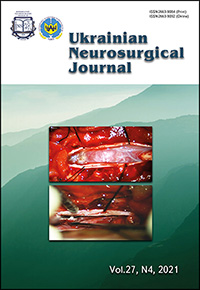The impact of extent of resection in surgical outcome of pilomyxoid astrocytoma: a case study
DOI:
https://doi.org/10.25305/unj.242926Keywords:
astrocytoma, extent of resection, pilomyxoid astrocytoma, glioma, pilocytic astrocytomaAbstract
The pilomyxoid astrocytoma (PMA) is a rare glioma that has recently been identified as a separate entity and is frequently found in the hypothalamic region. PMA is a subtype of pilocytic astrocytoma (PA), with clinical, histological, and molecular data indicating a close relationship as well as more aggressive biological behaviour in the former. There is still doubt in surgical outcome of PMA that the extent of resection, independent of location or age, is a key factor of recurrence and subsequent therapeutic choices. However, further study is needed to better understand its behaviour and, as a result, establish a consensus on its management.
This research features a 2-year-6-month-old female who sought medical attention after complaining of weight loss for four weeks and vomiting for two weeks prior to her visit to the doctor. She had no additional symptoms. Only bilateral pailledema was found during the physical examination. The magnetic resonance imaging (MRI) scans revealed a tumor in the sellar area with heterogeneous enhancement. The patient had ventriculoperitoneal (VP) shunting followed by partial tumor excision twice (Extent of resection 35 percent followed by 16 percent as total 51 percent). The histology and immunohistochemical investigations revealed typical PMA characteristics. Adjuvant treatment, which included chemotherapy and radiosurgery, was initiated for the patient. She has been asymptomatic for two years and has showed no indications of progression of the disease on follow-up scans.
References
Gader G, Belkahla G, Karmani N, Saadaoui K, Rkhami M, Kallel J, Zammel I, Badri M. Pediatric Cerebellar Pilomyxoid Astrocytoma: Clinical and Radiological Findings in Three Cases. Asian J Neurosurg. 2020 Apr 7;15(2):262-265. doi: 10.4103/ajns.AJNS_268_19
Karthigeyan M, Singhal P, Salunke P, Vasishta RK. Adult Pilomyxoid Astrocytoma with Hemorrhage in an Atypical Location. Asian J Neurosurg. 2019 Jan-Mar;14(1):300-303. doi: 10.4103/ajns.AJNS_164_18
Kim SH, Kang SS, Jung TY, Jung S. Juvenile pilomyxoid astrocytoma in the opticohypothalamus. J Korean Neurosurg Soc. 2010 Nov;48(5):445-7. doi: 10.3340/jkns.2010.48.5.445
Fomchenko EI, Reeves BC, Sullivan W, Marks AM, Huttner A, Kahle KT, Erson-Omay EZ. Dual activating FGFR1 mutations in pediatric pilomyxoid astrocytoma. Mol Genet Genomic Med. 2021 Feb;9(2):e1597. doi: 10.1002/mgg3.1597
Komotar RJ, Mocco J, Jones JE, Zacharia BE, Tihan T, Feldstein NA, Anderson RC. Pilomyxoid astrocytoma: diagnosis, prognosis, and management. Neurosurg Focus. 2005 Jun 15;18(6A):E7.
Benyakhlef S, Tahri A, Khlifi A, Abdelouahab H, Imane K, Moufid F, Rouf S, Latrech H. Failure to Thrive Revealing a Pilomyxoid Astrocytoma: An Uncommon Case Report with Literature Review. Case Rep Pediatr. 2021 Sep 27;2021:6670585. doi: 10.1155/2021/6670585
Gupta K, Tewari MK, Salunke P. Pilocytic Astrocytoma with Gangliocytic Differentiation to Pilomyxoid Astrocytoma-expanding the Morphological Spectrum: Case Report and Literature Review. Asian J Neurosurg. 2018 Oct-Dec;13(4):1193-1196. doi: 10.4103/ajns.AJNS_247_17
Ding C, Tihan T. Recent Progress in the Pathology and Genetics of Pilocytic and Pilomyxoid Astrocytomas. Balkan Med J. 2019 Jan 1;36(1):3-11. doi: 10.4274/balkanmedj.2018.1001
Arslanoglu A, Cirak B, Horska A, Okoh J, Tihan T, Aronson L, Avellino AM, Burger PC, Yousem DM. MR imaging characteristics of pilomyxoid astrocytomas. AJNR Am J Neuroradiol. 2003 Oct;24(9):1906-8
Kil JS, Lee KH, Eom KS, Kim TY. Intermediate Pilomyxoid Astrocytoma in the Cerebellum of a 5-Year-Old Boy. Brain Tumor Res Treat. 2018 Apr;6(1):39-42. doi: 10.14791/btrt.2018.6.e6
Pruthi SK, Chakraborti S, Naik R, Ballal CK. Pilomyxoid astrocytoma with high proliferation index. J Pediatr Neurosci. 2013 Sep;8(3):243-6. doi: 10.4103/1817-1745.123694
Linscott LL, Osborn AG, Blaser S, Castillo M, Hewlett RH, Wieselthaler N, Chin SS, Krakenes J, Hedlund GL, Sutton CL. Pilomyxoid astrocytoma: expanding the imaging spectrum. AJNR Am J Neuroradiol. 2008 Nov;29(10):1861-6. doi: 10.3174/ajnr.A1233
Patibandla MR, Thotakura AK, Uppin M, Challa S, Addagada GC, Nukavarapu M. Parietal pilomyxoid astrocytoma with recurrence in 10 months: A case report and review of literature. Asian J Neurosurg. 2016 Jul-Sep;11(3):323. doi: 10.4103/1793-5482.145158
Pereira FO, Lombardi IA, Mello AY, Romero FR, Ducati LG, Gabarra RC, Zanini MA. Pilomyxoid astrocytoma of the brainstem. Rare Tumors. 2013 Apr 15;5(2):65-7. doi: 10.4081/rt.2013.e17
Kim S, Kang M, Choi S, Kim DC. Pilomyxoid Astrocytoma Occurring in the Third Ventricle. J Clin Imaging Sci. 2015 Jul 31;5:41. doi: 10.4103/2156-7514.161853
Tjahjadi M, Arifin MZ, Sobana M, Avianti A, Caropeboka MS, Eka PA, Agustina H. Cystic pilomyxoid astrocytoma on suprasellar region in 7-year-old girl: Treatment and strategy. Asian J Neurosurg. 2015 Apr-Jun;10(2):154-7. doi: 10.4103/1793-5482.154989
Downloads
Published
How to Cite
Issue
Section
License
Copyright (c) 2021 D. Chaulagain, V. I. Smolanka, A. V. Smolanka, T. S. . Havryliv

This work is licensed under a Creative Commons Attribution 4.0 International License.
Ukrainian Neurosurgical Journal abides by the CREATIVE COMMONS copyright rights and permissions for open access journals.
Authors, who are published in this Journal, agree to the following conditions:
1. The authors reserve the right to authorship of the work and pass the first publication right of this work to the Journal under the terms of Creative Commons Attribution License, which allows others to freely distribute the published research with the obligatory reference to the authors of the original work and the first publication of the work in this Journal.
2. The authors have the right to conclude separate supplement agreements that relate to non-exclusive work distribution in the form of which it has been published by the Journal (for example, to upload the work to the online storage of the Journal or publish it as part of a monograph), provided that the reference to the first publication of the work in this Journal is included.









